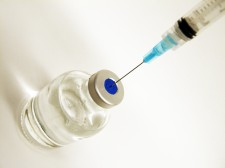 The long-awaited results of a clinical trial of the world s first potential malaria vaccine among infants are finally in and somewhat disappointing. Known as RTS,S, the vaccine was tested on babies under 12 weeks old and found to reduce malaria incidence by about one-third in the children who received it, compared to controls. The new results are especially disheartening after last year s malaria vaccine trial one of the largest, involving nearly 16,000 children in seven African countries demonstrated that the vaccine lowered malaria incidence and severe malaria among children ages five to 17 months by 55 and 47 percent, respectively.
The long-awaited results of a clinical trial of the world s first potential malaria vaccine among infants are finally in and somewhat disappointing. Known as RTS,S, the vaccine was tested on babies under 12 weeks old and found to reduce malaria incidence by about one-third in the children who received it, compared to controls. The new results are especially disheartening after last year s malaria vaccine trial one of the largest, involving nearly 16,000 children in seven African countries demonstrated that the vaccine lowered malaria incidence and severe malaria among children ages five to 17 months by 55 and 47 percent, respectively.
With malaria still killing an estimated 600,000 to 900,000 people a year most of whom young children in sub-Saharan Africa these new results suggest that scientists still have their work cut out for them. In the study, published online in the New England Journal of Medicine, researchers revealed that over 12 months of follow-up, when administered along with standard childhood vaccines, the efficacy of RTS,S in infants aged 6 to 12 weeks (at first vaccination) against clinical and severe malaria was only 31 and 37 percent, respectively.
Although we hoped for better numbers, says ACSH s Dr. Gilbert Ross, I remain hopeful. When there are between 600,000 and 900,000 deaths from malaria a year, a 30-40 percent benefit will still save many thousands of infants. While this is a major improvement from the tragic toll of even five and 10 years ago, we in public health have a long way to go. He concludes, Rather than being disappointed and disheartened, these results should be considered a great achievement and provide motivation for further research towards developing a more effective vaccine.